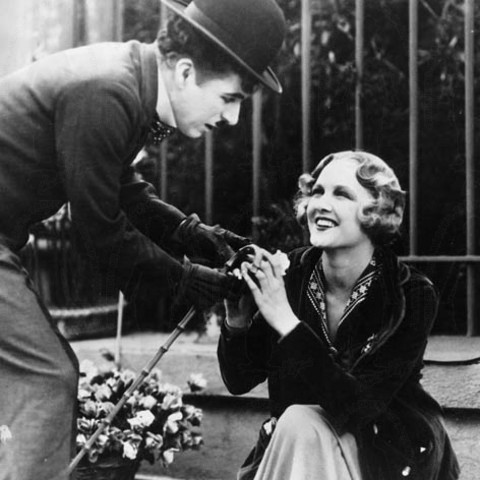Before Citizen Kane took a stranglehold on best American film (which it still hasn't released) that unofficial title often went to Charlie Chaplin's masterpiece City Lights. The Tramp was already a well-known character at the point. He was a bemused outsider who always seemed to get mixed up in crazy situations. Chaplin had several successes in the 1920's, most recently The Gold Rush and The Circus, so he had a lot of latitude when this film started production in 1928. A newer director would have tried to make a "talkie" after the success of The Jazz Singer. Chaplin's vision would not be compromised. The age of talking pictures could wait until he was done.
The production of City Lights is well-documented and could easily inspire its own film. It took more than three years to get this film ready for release. Some of his favorite scenes didn't make the final cut. Others were filmed hundreds of times. He was trying convey information through character reactions, like how a blind flower girl thought the Tramp was wealthy. Even then he often wasn't satisfied. His relationship with Virginia Cherrill, who had no prior acting experience, was strained - he actually fired her once before swallowing his pride and taking her back on her terms. There's no question working with this man would have been a nightmare. And yet, when you see the final product, it's hard to believe a single take was not needed.
The Tramp begins the movie in an absurd situation, as usual. He's asleep on a statue that's being dedicated (or something), so a huge crowd sees him. The politicians are speaking gibberish - a not-too-subtle jab at political speech, and the Tramp clumsily extricates himself from the situation. He isn't even embarrassed. He just needed a place to sleep. His daily routine seems to involve wandering the streets looking for the occasional discarded cigar. It's not even clear how he finds food or where he normally sleeps. He's just there.
When he meets the young flower girl (none of the characters are named), he wants to help. He gives her his last coin and she clumsily reaches for his lapel. When the flower drops and she can't find it, he realizes she is blind. He is energized by their interaction, even smelling the flower long after he leaves her. It's likely he just appreciated any attention in a society that treats his with derision, if they notice him at all.
The other main character is a distraught millionaire intent on taking his own life. The Tramp stops in (the scene manages to be quite comical) and the man considers him a friend for life. We later find out that only applies when the millionaire is drunk and his memory isn't too good when he's sober. Still, they spend a wild night out in the clubs drinking and blowing off steam. When they return home, the Tramp sees the flower girl again and gets money from the millionaire to buy all of her flowers. He takes her home and then isn't welcome into the millionaire's house when he gets back.
The tramp visits the flower girl at her apartment, although their affection don't go beyond a kiss on the hand. Chaplin was very particular about his character being chaste towards women. (Not so much in real life.) The girl lives with her grandmother, who of course isn't blind, but she is never around and the Tramp can keep up the illusion of wealth. He discovers that she needs rent money and goes about getting the money in a one-day period. The lengths he goes to help her are both comical and touching. It doesn't matter what happens to him. She will be taken care of. That's self-sacrifice.
The music couldn't be more fitting. It's probably no surprise that Chaplin composed it himself. Each main character seems to have his or her own entrance theme, which changes appropriately to the tone of the scene. And it plays into the highly cherished final scene where the flower girl finally learns the truth. He just wants her to be happy and she just wants to say thank you. These are two genuinely good characters.
City Lights has never and will likely never be remade. Not just as a movie, but even as a play, musical, or (God forbid) a television special. It wouldn't even work as literature. This story has to be experienced as a film, and more specifically, this film. As silent movies get further in our rear-view mirror, more titles will be forgotten. Chaplin will still be remembered.
